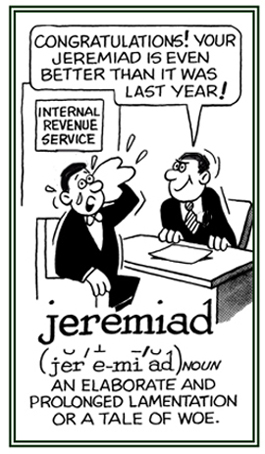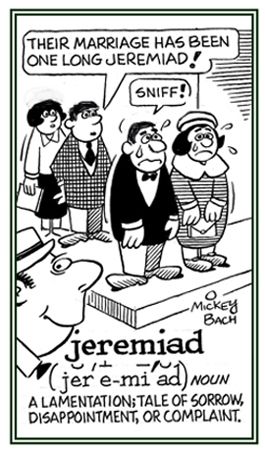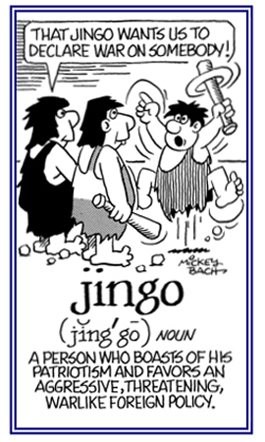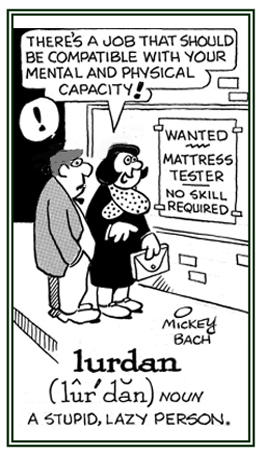English Words in Action, Group J
(a variety of English words which have developed through history and are currently used in our modern age)
Simply click on this banner (or the following link) and you will be on your way to stimulate your brain for greater word comprehension with quizzes based on some of the words in this unit.
2. A covering for the outside of a book designed to protect it: The book was protected by a jacket of clear plastic.
2. Relating to someone who is disinterested and bored: Janice told Glenda that the Parisians are jaded and not easily impressed by foreigners.

Go to this Word A Day Revisited Index
so you can see more of Mickey Bach's cartoons.
2. A mournful complaint about one's terrible situation: Mary wrote a jeremiad grieving about her present plight of losing her husband, about her children living so far away, and not hearing well at all.


Go to this Word A Day Revisited Index
so you can see more of Mickey Bach's cartoons.
Don't confuse this jingo with another one that means ringing and tinkling, or singing a commercial tune or ditty.


Go to this Word A Day Revisited Index
so you can see more of Mickey Bach's cartoons.
2. To move or to cause to move repeatedly by bouncing up and down: Marvin's grandfather was enjoying the opportunity to jounce his granddaughter on his knee.
3. Etymology: used from about 1440, of unknown origin; perhaps a blend of jump and bounce.
The fleet of trucks advanced on the pit mine like a juggernaut, inexorably powerful and unstoppable.
When capitalized, Juggernaut refers to the idol of the Hindu god Krishna, which was pulled around on a huge cart or wagon.
2. Origin: The Hindustani name for juggernaut was jaganath, "world-protector".Devotees of the god are said to have thrown themselves under the wheels to be crushed to death in their frenzies of devotion; so, juggernaut came to mean anything to which we are blindly enslaved or as an irresistible crushing force.
Whether this was actually the practice or merely a misinterpretation of the deaths of those caught in the crush of people pulling the over-sized wagon, the British associated willful self-destruction with the Jagannath during the festival of Puri every year.
2. Etymology: Middle English, from Old French lourdin, "heavy".

Go to this Word A Day Revisited Index
so you can see more of Mickey Bach's cartoons.
Links to all of the groups of English words in action, Groups A to Z.
You may see the bibliographic list of sources of information for these words in action.
